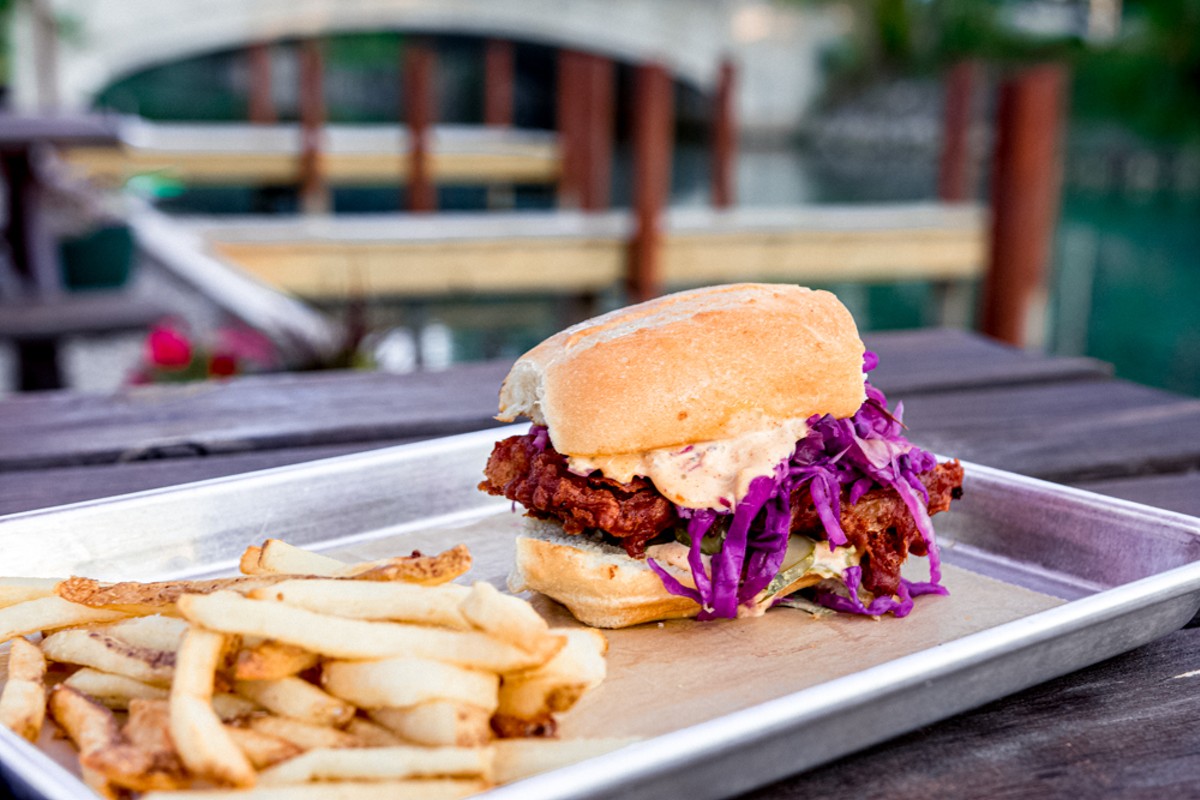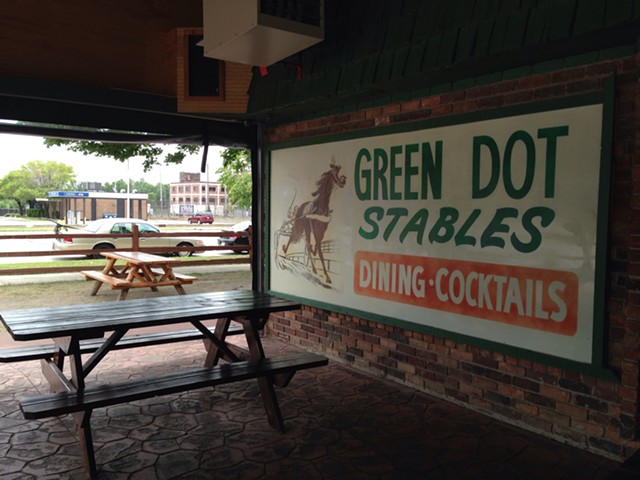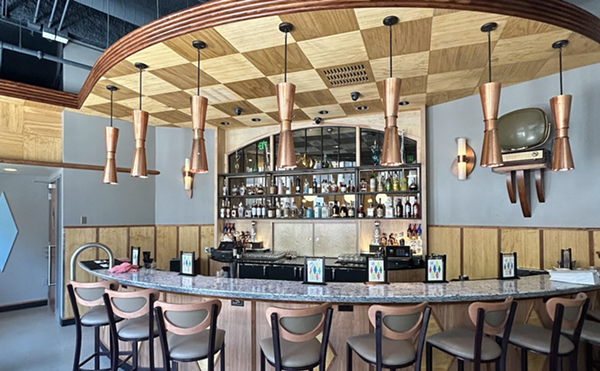Some folks may be itching to get back to indoor dining, but Coriander Kitchen and Farm offers the unequaled ideal of eating outside, pandemic or no. It has a huge deck with umbrella'd picnic tables next to a tranquil canal connected to Fox Creek, complete with swimming geese and goslings. Sitting beside the still green water does everything it should to calm the soul. While you wait for your order, you can bounce on the floating docks.
It's perfect now, but customers were "shockingly willing" to sit outside in the cold with their coats on when the space opened in early March, said co-owner Alison Heeres. Heeres runs the restaurant, and co-owner Gwen Meyer runs the farm part of the business, on a plot near Eastern Market. "It was a funny experiment," she says.
The restaurant building next to the deck, which will open when that seems safe, was once Fisherman's Marina, a boat mechanic shop, convenience store, and bait shop, which sat vacant for 17 years. Meyer's husband, Alex Howbert, lived in the neighborhood and grew up going to the shop, also known as Tommy's; it sold worms and fried chicken and rented motorboats. Customers today "are always saying 'I used to come here when I was a kid,'" says Heeres. The three turned the second floor into a rooftop patio, replaced a seawall and the roof, removed a gas tank from the patio, and added fire pits.
The menu is "farm-elevated bar food" with the owners' hand-planted farm providing the majority of herbs and vegetables during the growing season. The two most popular items, however, are the cheeseburger and the fried fish sandwich.
Those were fine, the fish a bit spicy with jalapeño slaw and preserved-lemon tartar sauce, the burger a third-pound from Marrow (cooked medium unless you specify). But for meat I vastly preferred grilled lamb on flatbread, luscious and fatty, with some caramelized onions, roasted red pepper sauce, and pickled green tomatoes. You choose regular fries, skinny sweet-potato fries, or vinegary housemade chips (the latter are free) to go with. Jerked tofu is possible for the meat-averse.
An appetizer of smoked whitefish and trout is freshened up with dill. Mezze are seasonal, depending on what the farm is offering. I got olives, giant spears of asparagus in lemon sauce, and three whole radishes with a mellow tzatziki.
Warm halloumi, the semi-soft cheese from Cyprus, is expertly grilled and served with green lentils and zhug, a Yemeni pounded condiment of parsley, cilantro, and something hot. If it's still there when I go back, I'll order smoked mushrooms with ramps and spinach with hazelnut and white bean cream. A half-pound of fried smelt and a kale-romaine Caesar are other possibilities.
Heeres says she didn't foresee "how intense cocktail ordering would be," after pandemic easing got people out of the house. Bar manager Alexa Gallo is using farm products like pickled gooseberries, cilantro for a margarita, rhubarb with rum and Campari, chive blossoms. The Beetnik uses beet juice from the farm. My Rhubarb and Star came out tasting pleasantly like grapefruit, bittersweet.
Heeres and Meyer are keeping costs down by hiring fewer servers; customers submit their own orders on their phones (separately for drinks and food) and bus their dishes afterward. Heeres explains that, with fewer servers, she can pay them more. All make between $15 and $20 an hour, plus tips. A shared tip pool also raises wages for the kitchen staff.
"We want to have a low-service model to keep our prices where they are," she says. "Our goal is to pay our staff more than what staff is traditionally paid in this industry. It's a physically demanding job; it's cognitively demanding. The way to pay people more is to have fewer people on staff. The way you can do that is to have customers take more of the responsibility of getting their product."
I was taken aback to think that automation is now replacing service-sector jobs, too. We know it's cost millions of manufacturing positions, and it sure didn't raise pay for those who remain — autoworkers at the Big Three at one point this century got no raise for 10 years. It's great that Heeres and Meyer will do the right thing for a smaller staff — but what of the vast majority of owners who'll just make the customer do the work and pocket the profit?
Fewer jobs don't usually translate to better ones. Yes, I use an ATM, but I sure don't pick the self-service line at Kroger, and I prefer some human contact with my meal. What if you have a question about the menu?
To get to Coriander, take Alter Road to where it ends at the Detroit River. No reservations; expect a wait — it's popular.
Stay connected with Detroit Metro Times. Subscribe to our newsletters, and follow us on Google News, Apple News, Twitter, Facebook, Instagram, or Reddit.







